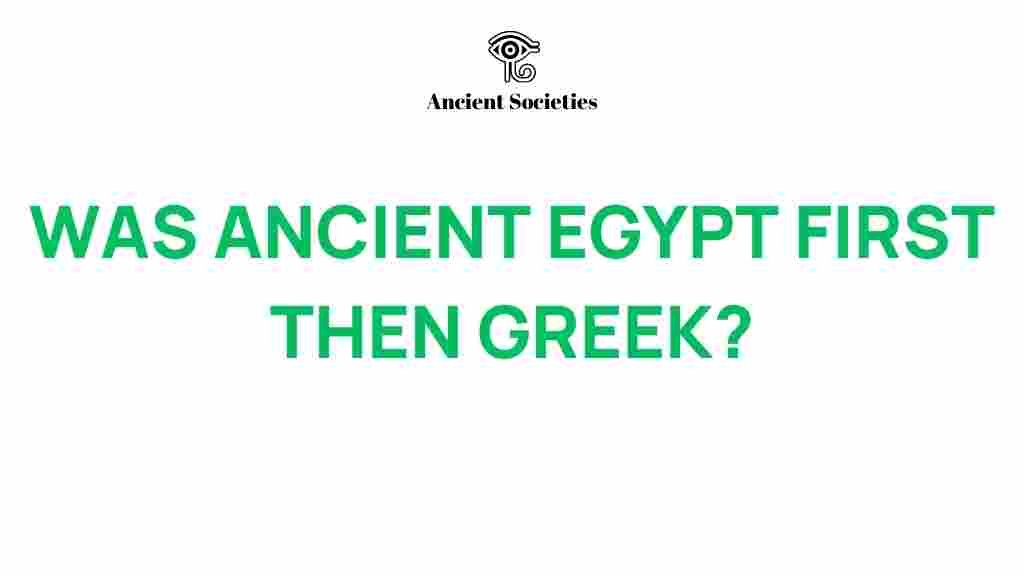Unraveling the Timeline: Did Ancient Egypt Precede Greek Civilization?
The question of whether Ancient Egypt preceded Greek civilization has long been the subject of historical debate among scholars, archaeologists, and enthusiasts of ancient societies. Understanding the timeline of these two remarkable ancient civilizations is crucial for grasping their impact on world history, culture, and development. This article delves into the significant milestones of both civilizations, exploring their contributions, cultural exchanges, and the archaeological evidence that helps us piece together this intricate historical puzzle.
The Origins of Ancient Egypt
Ancient Egypt, known for its rich history and monumental architecture, emerged as one of the world’s earliest and most influential civilizations. The timeline of Ancient Egypt can be broadly divided into several key periods:
- Prehistoric Egypt (c. 6000 – 3100 BCE): This era saw the development of agriculture and the establishment of settlements along the Nile River.
- Early Dynastic Period (c. 3100 – 2686 BCE): Marked by the unification of Upper and Lower Egypt under the first pharaohs.
- Old Kingdom (c. 2686 – 2181 BCE): Known for the construction of the pyramids and the establishment of a strong central government.
- Middle Kingdom (c. 2055 – 1650 BCE): A period of stability and prosperity, characterized by literature, art, and architecture.
- New Kingdom (c. 1550 – 1070 BCE): Egypt reached its zenith, expanding its territory and influence, with notable pharaohs like Ramses II.
The Rise of Greek Civilization
Greek civilization developed later, with its roots starting in the Aegean region. The timeline of Greek civilization can be categorized into several significant phases:
- Mycenaean Period (c. 1600 – 1100 BCE): Characterized by palace societies and trade networks throughout the Mediterranean.
- Dark Ages (c. 1100 – 800 BCE): A period of decline following the collapse of Mycenaean civilization.
- Archaic Period (c. 800 – 500 BCE): The resurgence of Greek culture, the establishment of city-states, and the introduction of the alphabet.
- Classical Period (c. 500 – 323 BCE): Marked by the height of democracy in Athens, significant philosophical advancements, and monumental architecture.
Comparing Timelines: Where Do They Overlap?
Based on the timelines provided, it is evident that Ancient Egypt predates Greek civilization by several centuries. The key comparison points are:
- Ancient Egyptian civilization began around 3100 BCE, while the Greek civilization, in its Mycenaean phase, began around 1600 BCE.
- The Old Kingdom of Egypt (c. 2686 – 2181 BCE) coincided with the late Mycenaean period in Greece.
- Egyptian influence can be observed in Greek art and architecture during the Archaic and Classical periods, suggesting cultural exchanges.
Archaeology and Cultural Exchange
Archaeological findings play a crucial role in understanding the relationship between Ancient Egypt and Greek civilization. Key discoveries include:
- Trade Routes: Archaeological evidence indicates that trade between Egypt and the Aegean began as early as the 3rd millennium BCE.
- Art and Religion: Many Greek artists and architects were inspired by Egyptian styles, particularly in sculpture and temple design.
- Literature and Philosophy: Greek philosophers such as Plato and Aristotle acknowledged the contributions of Egyptian thought to their own ideas.
These archaeological insights not only affirm the timeline but also illustrate the profound cultural connections that existed between these two ancient societies.
Historical Debate: The Nature of Influence
The historical debate surrounding the influence of Ancient Egypt on Greek civilization is both complex and fascinating. Key points in this discussion include:
- Direct Influence: Some scholars argue that the Greeks directly borrowed and adapted Egyptian concepts in art, architecture, and religion.
- Indirect Influence: Others suggest that the influence may have been more indirect, through intermediaries such as the Phoenicians.
- Independent Development: Some researchers maintain that while there was contact, both civilizations developed independently, each with unique cultural identities.
Understanding these different perspectives is vital to appreciating the historical context and the dynamics of cultural exchange between these two ancient civilizations.
Challenges in the Timeline: Troubleshooting the Historical Record
While the timelines of Ancient Egypt and Greek civilization are generally agreed upon, several challenges can complicate our understanding:
- Incomplete Archaeological Records: Many sites remain unexplored, and existing artifacts can be misinterpreted or lost.
- Dating Techniques: Different archaeological dating methods can yield varying timelines, leading to confusion.
- Political and Cultural Bias: Historians’ backgrounds may influence their interpretations of the evidence.
Addressing these challenges requires a multidisciplinary approach, drawing on archaeology, anthropology, and history to form a more comprehensive picture of these ancient societies.
Conclusion: The Legacy of Ancient Egypt and Greek Civilization
In conclusion, the timeline reveals that Ancient Egypt indeed preceded Greek civilization by several centuries, laying the groundwork for many aspects of Western culture. The archaeological evidence supports a rich tapestry of cultural exchange and influence between these two great civilizations. Understanding their interconnectedness not only enriches our knowledge of history but also highlights the enduring legacy of ancient societies on contemporary life.
For those interested in exploring this topic further, additional resources can be found at Ancient History Encyclopedia, where you can delve deeper into the cultural and historical significance of these ancient civilizations.
If you’re eager to learn more about the influences of ancient civilizations, consider checking out our article on Cultural Interactions in Ancient Societies.
This article is in the category History and created by AncientSocieties Team
